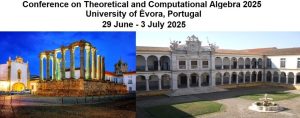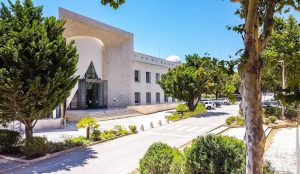- 13 July 2025
-
-
[VAL] Charles Johnson (The College of William & Mary, Williamsburg, Virginia, USA)
5 July 2025 - 13 July 2025 -
-
- 14 July 2025
-
-
Computability in Europe (CiE) 2025
14 July 2025 - 18 July 2025 -
More information is available here.
-
[VSRM] Kamila Trzcińska (Department of Statistical Methods, Faculty of Economics and Sociology University of Lodz, Poland)
14 July 2025 - 22 July 2025 -
Venue: office 410, 4th floor of the "Departamento de Engenharia Mecânica e Industrial (DEMI)" Building
-
- 15 July 2025
-
-
Computability in Europe (CiE) 2025
14 July 2025 - 18 July 2025 -
More information is available here.
-
[VSRM] Kamila Trzcińska (Department of Statistical Methods, Faculty of Economics and Sociology University of Lodz, Poland)
14 July 2025 - 22 July 2025 -
Venue: office 410, 4th floor of the "Departamento de Engenharia Mecânica e Industrial (DEMI)" Building
-
- 16 July 2025
-
-
Computability in Europe (CiE) 2025
14 July 2025 - 18 July 2025 -
More information is available here.
-
[VSRM] Kamila Trzcińska (Department of Statistical Methods, Faculty of Economics and Sociology University of Lodz, Poland)
14 July 2025 - 22 July 2025 -
Venue: office 410, 4th floor of the "Departamento de Engenharia Mecânica e Industrial (DEMI)" Building
-
- 17 July 2025
-
-
Computability in Europe (CiE) 2025
14 July 2025 - 18 July 2025 -
More information is available here.
-
[VSRM] Kamila Trzcińska (Department of Statistical Methods, Faculty of Economics and Sociology University of Lodz, Poland)
14 July 2025 - 22 July 2025 -
Venue: office 410, 4th floor of the "Departamento de Engenharia Mecânica e Industrial (DEMI)" Building
-
- 18 July 2025
-
-
Computability in Europe (CiE) 2025
14 July 2025 - 18 July 2025 -
More information is available here.
-
[VSRM] Kamila Trzcińska (Department of Statistical Methods, Faculty of Economics and Sociology University of Lodz, Poland)
14 July 2025 - 22 July 2025 -
Venue: office 410, 4th floor of the "Departamento de Engenharia Mecânica e Industrial (DEMI)" Building
-
- 19 July 2025
-
-
[VSRM] Kamila Trzcińska (Department of Statistical Methods, Faculty of Economics and Sociology University of Lodz, Poland)
14 July 2025 - 22 July 2025 -
Venue: office 410, 4th floor of the "Departamento de Engenharia Mecânica e Industrial (DEMI)" Building
-
- 20 July 2025
-
-
[VSRM] Kamila Trzcińska (Department of Statistical Methods, Faculty of Economics and Sociology University of Lodz, Poland)
14 July 2025 - 22 July 2025 -
Venue: office 410, 4th floor of the "Departamento de Engenharia Mecânica e Industrial (DEMI)" Building
-
- 21 July 2025
-
-
[VSRM] Kamila Trzcińska (Department of Statistical Methods, Faculty of Economics and Sociology University of Lodz, Poland)
14 July 2025 - 22 July 2025 -
Venue: office 410, 4th floor of the "Departamento de Engenharia Mecânica e Industrial (DEMI)" Building
-
- 22 July 2025
-
-
[VSRM] Kamila Trzcińska (Department of Statistical Methods, Faculty of Economics and Sociology University of Lodz, Poland)
14 July 2025 - 22 July 2025 -
Venue: office 410, 4th floor of the "Departamento de Engenharia Mecânica e Industrial (DEMI)" Building
-
Conferences & Workshops
Conference on Theoretical and Computational Algebra 2025
The 2025 Conference on Theoretical and Computational Algebra will be...
Read MoreComputability in Europe (CiE)
Computability in Europe (CiE) will be held at Faculdade de Ciências...
Read More17th Conference on Dynamical Systems Applied to Biology and Natural Sciences, DSABNS 2026
The 17th Conference on Dynamical Systems Applied to Biology and...
Read More93rd Séminaire Lotharingien de Combinatoire
The 93rd Séminaire Lotharingien de Combinatoire will be held in...
Read MoreLYMC 2025 – Lisbon Young Mathematicians Conference
The Lisbon Young Mathematicians Conference 2025 – LYMC 2025 will...
Read MoreNOVA Math – UNIDEMI Talks – 9th Edition
NOVA MATH – UNIDEMI Talks Date | Time: July 10, 2024 | 15h00 –...
Read MoreFor Outreach Events see our webpage Outreach & Educational Programmes.






